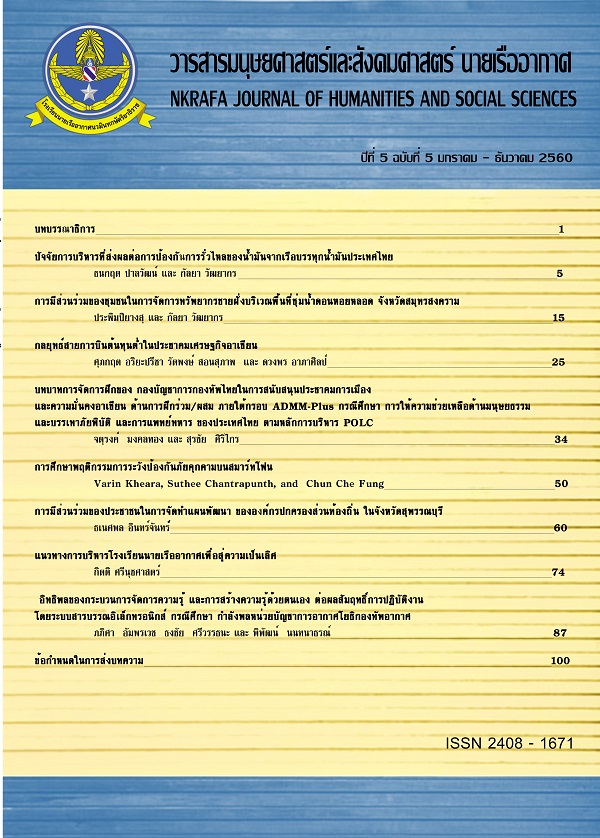The Influence Of Knowledge Management Process and Constructionism on Achievement by E-Admin A Case Study of Personel Royal Thai Air Force Security Forces Command
Main Article Content
Abstract
This quantitative research was aimed to study the influences of knowledge management process and constructionism on achievement by e-admin. Questionnaires were employed to collect data from the population, who were government officers of Royal Thai Air Force Security Forces Command, Royal Thai Air Force. Descriptive statistics were used for data analysis, i.e., frequency, percentage, statistic mean, standard deviation, and Pearson’s correlation coefficient. Multiple regression analysis was brought for hypothesis test. The results indicated that the samples included 340 males and 60 females. 166 of them were 18-30 years old, 156 of them were 31-40 years old, and 78 of them were 41 years old and above. There were 207 non-commissioned officers, 121 commissioned officers, and 72 government employees.
The results of the study were as follows: Hypothesis testing showed that knowledge management process was high level in knowledge application and knowledge creation respectively. The lowest level was in knowledge acquisition. Other constructionism was high level doing by learning and explore respectively. The lowest level was in learning by doing was statistically at the of0.05 level significant. The study were found suggested that in order to Achievement of information technology in knowledge management process was high level in knowledge application and knowledge creation respectively. The lowest level was in knowledge acquisition. Other constructionism was high level doing by learning and explore respectively. The lowest level was in learning by doing was statistically.
Article Details
บทความที่ได้รับการตีพิมพ์เป็นลิขสิทธิ์ของวารสารมนุษยศาสตร์และสังคมศาสตร์ นายเรืออากาศ
ข้อความที่ปรากฎในบทความแต่ละเรื่องในวารสารวิชาการเล่มนี้ เป็นความคิดเห็นส่วนตัวของผู้เขียนแต่ละท่าน ไม่เกี่ยวข้องกับโรงเรียนนายเรืออากาศฯ และคณาจารย์ท่านอื่น ๆในโรงเรียนนายเรืออากาศฯ แต่อย่างใด ความรับผิดชอบขององค์ประกอบทั้งหมดของบทความแต่ละเรื่องเป็นของผู้เขียนแต่ละท่าน หากมีความผิดพลาดใด ๆ ผู้เขียนแต่ละท่านจะรับผิดชอบบทความของตนเองแต่เพียงผู้เดียว
References
[2] เสกสรรค์ แย้มพินิจ.(2550). ปัญหาการศึกษาไทย ทัศนะ Constructionism กับการเรียนการสอน. (ออนไลน์) เข้าถึงได้จาก : http://pirun.ku.ac.th/-btun/column/segsan.htm (สืบค้นเมื่อ วันที่ 1 เมษายน 2559)
[3] ณภัทรวร เจริญศรี. (2553). ปัจจัยที่มีผลต่อการจัดการความรู้ของบุคคล ในบริษัทท่าอากาศยานไทย จำกัด (มหาชน). วิทยานิพนธ์ปรัชญาดุษฎีบัณฑิตสาขาการพัฒนาทรัพยากรมนุษย์, มหาวิทยาลัยรามคำแหง.
[4] สมพร ทรัพย์สวัสดิ์.(2554). การพัฒนารูปแบบการเรียนการสอน Video-Integration-Project(VIP) สำหรับนักเรียนระดับมัธยมศึกษาตอนต้น. ปริญญาศึกษาศาสตรดุษฎีบัณฑิต, มหาวิทยาลัยรังสิต.
[5] วรารี แก้วน่วม. (2556). ปัจจัยที่ส่งผลต่อการรับรู้ถึงประโยชน์ของการจัดการความรู้ กรณีศึกษามหาวิทยาลัยเกษตรศาสตร์ วิทยาเขตบางเขน, ปริญญาบริหารธุรกิจมหาบัณฑิต, มหาวิทยาลัยเกษตรศาสตร์.
[6] มณีวรรณ คนยืน. (2558). อิทธิพลภาวะผู้นำต่อวัฒนธรรมองค์การ การจัดการความรู้ และผลการปฏิบัติงานบริษัทปูนซิเมนต์ไทยจำกัด (มหาชน).วิทยานิพนธ์บริหารธุรกิจดุษฎีบัณฑิต, มหาวิทยาลัยรามคำแหง.
[7.] สำนักงานคณะกรรมการพัฒนาระบบราชการ. 2555.กระบวนการจัดการความรู้(ออนไลน์).เข้าถึงได้จาก :http://www.opdc.go.th/, (สืบค้นเมื่อวันที่ 15 กรกฎาคม 2559).
[8.] Ahmed, P.K., A.Y.E. Loh, et al. (1999). “Cultures for Continuous Improvement and Learning.” Total Quality Management10(4/5)
[9.] Davenport T.H., & Prusak L.(1998) Working knowledge How Organizations Manage What They Know.Boston:Harvard Business School Press.
[10] Goh, S., & Richards, G.(1997). Benchmarking the learning capability of organization. European Management Journal, 15(5).
[11] Khalil, O., Claudio, A., &Seliem, A.(2006). Knowledge Management The case of the Acushnet company. SAM Advanced Management Journal, 71(3), 34-44
[12] Nonaka, I. &Takuchi, H.(1995). The Knowledge-Creating Company. Oxford University Press, New York.Senge, P.M.(1990). The fifth discipline: The art and practice of the learning organization. New York, NY. Doubleday.
[13] Sigala, M. &Chalkiti, K. (2007), “Improving performance through tacit knowledge externalization and utilization: preliminary findings from Greek hotels”, International Journal of Productivity and Performance Management, Vol. 56 No.5/6
[14] Yang, J.T.(2007). Knowledge sharing: Investigating appropriate leadership roles andcollaborative culture. Tourism Management, 28(2).


